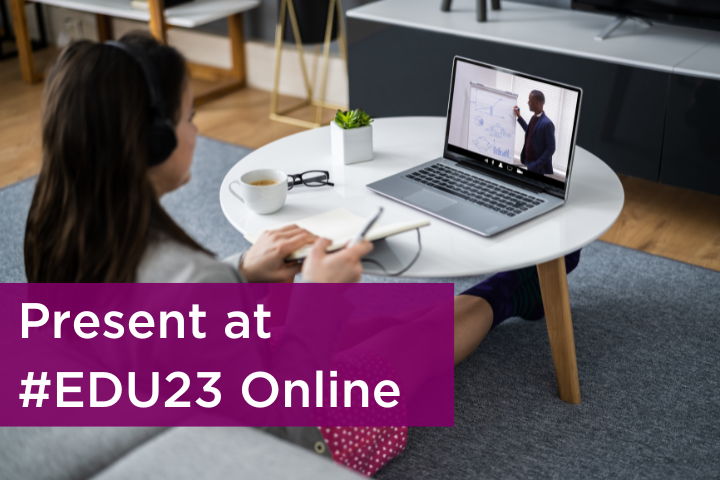
Present your industry expertise during the online experience of the EDUCAUSE Annual Conference, taking place October 18–19.
Industry Insights Presentations
Conduct a 20 or 40-minute presentation on topics of interest, lessons learned, foresight, or case-making evidence related to a conference theme.
Your presentation must be educational in nature and conducted with at least one presenter from a higher education institution or via a diverse panel of up to four presenters.
Program Tracks/Areas of Focus
Security, privacy, and compliance continue to be top-of-mind initiatives at each of our organizations. With the pace of change picking up speed and the focus on privacy and security at the start rather than as an afterthought, we seek proposals focused on strategic themes, as well as highly technical and tactical talks. Also welcomed are proposals relating to proactive initiatives to protect against increasingly sophisticated attacks and breach response events.
Explore the application of data, information, and analysis to institutional challenges. The goal? Build a data-informed culture to facilitate decision-making at all organizational levels and across all areas. Topics include data ethics, privacy, data literacy, and data-informed decision-making.
Where we work, how we work, and the work we do are changing. Our institutions are working hard to adapt to the financial, social, technological, and pandemic-driven changes in our workforce. Explore leading practices and lessons learned, discuss the future of employment, and engage with others facing similar challenges as our workforce and work continue to evolve.
The practices of IT service delivery and digital transformation rely on the successful convergence of information systems, cloud computing infrastructure, and a support-and-skills model that makes it all work across the breadth of higher education institutions, not just central IT. Modernizing infrastructures can increase agility and flexibility, bolster data protection, and encourage innovation. Topics in this track include infrastructure services and enterprise architecture/systems, as well as frameworks and strategies for effective, efficient IT service management, including agile, DevOps, ITIL, chatbots, and pedestrian ERPs.
Our organizations need to change, but technology and innovation can be disruptive. How is technology changing your organization? What’s new, what’s innovative, what’s next, and how can it serve higher education? Explore artificial intelligence, ubiquitous technology and connectivity, next-generation ERPs, digital transformation initiatives, and other emerging technologies as we look into the future together while discussing the impact innovation and cutting-edge technology are having now.
IT plays a key role in serving the needs of the entire institution. IT leadership must ensure that technology resources and efforts are strategically aligned with the institution’s vision and goals. Leaders must also ensure that the IT organization is a strategic partner in the operations of the institution. What successes or challenges have you experienced that would be helpful for your peers?
The digital student experience is evolving to support learners from recruitment and throughout their careers. Technology informs, supports, and transforms the way colleges and universities recruit, educate, and retain students and connect with alumni. Institutions with adaptable and student-centered technology designs can effectively connect students with the campus through engagement in institutional activities and academic success tools to enrich their experience. Explore the ways higher education has successfully responded to the changing expectations of learners, families, and alumni.
IT is a key partner in support of institutional research missions. IT supports aspects of research administration, such as pre- and post-award support, interaction with federal grant systems, regulatory compliance, intellectual property management, and infrastructure support for research activities, which includes centralized versus decentralized approaches, high-performance computing, advanced networking, informatics, and enabling multidisciplinary, interdisciplinary, and inter-institutional work.
What effective principles and practices for teaching and learning have you established? How have you anticipated/adjusted to the needs of your students, encouraged successful learning, or transformed student learning and engagement? Some areas of focus include artificial intelligence, learning analytics, learning tools, learning spaces, hybrid learning (learning modalities), and accessibility.
Please note: In-person registrants will have access to both the online and in-person sessions. Also, your company may purchase one in-person presentation and one online presentation only.
Pricing
| Session Type | Price | Inclusions |
|---|---|---|
| 20-Minute Online Simulive Presentation | 6 Available A simulive presentation is a 20-minute pre-recorded session that runs during the online program. While the recording is being played, presenters are actively engaged in the chat, answering questions and interacting with attendees. |
$3,900 member $4,900 nonmember |
Three complimentary full-conference registrations (for access to the online program only) |
| 40-Minute Online Live Presentation | 6 Available Present live for 45-minutes during the online conference (October 18–19). |
$5,900 member $6,900 nonmember |
Four complimentary full-conference registrations (for access to the online program only) |
Already Participating?
Visit the Corporate Resource Center for all the details you need to prepare.
VISIT CORPORATE RESOURCE CENTER
EDUCAUSE Membership
EDUCAUSE members receive special pricing on all of our events, sponsorships, exhibits, and more. Learn more about the benefits of membership.